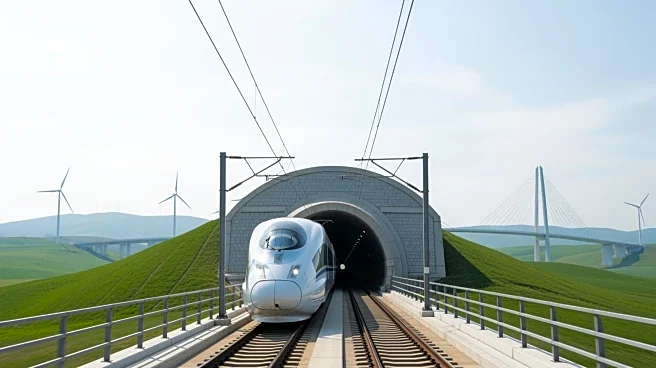What's Happening?
The European Commission has announced a comprehensive plan to expand high-speed rail networks across Europe by 2040. This initiative aims to significantly reduce travel times between major cities, enhancing connectivity and supporting the EU's goals of
carbon neutrality by 2050. The plan includes new cross-border routes and upgrades to existing lines, allowing trains to travel at speeds exceeding 200 kilometers per hour. Key routes will see travel times cut dramatically, such as Berlin to Copenhagen reduced from seven to four hours, and Sofia to Athens from nearly 14 to six hours. The initiative also seeks to ease congestion, boost rail capacity, and improve regional and overnight services.
Why It's Important?
The expansion of high-speed rail networks is crucial for Europe's economic and environmental objectives. By facilitating faster and more efficient travel, the plan supports the EU's ambition to become carbon-neutral by 2050, reducing reliance on air travel and road transport. It also enhances Europe's global competitiveness by improving infrastructure and connectivity, which can attract investment and stimulate economic growth. The initiative is expected to strengthen security by enabling swift movement of military and civilian freight, thus contributing to regional stability. Citizens across Europe will benefit from more affordable and faster travel options, fostering greater integration and cooperation within the EU.
What's Next?
Once implemented, the high-speed rail plan will transform travel across Europe, with significant reductions in journey times between key cities. For instance, trips from Tallinn to Riga will take just one hour 45 minutes, and from Riga to Vilnius about two hours. In Central Europe, Berlin to Vienna via Prague will be cut from over eight hours to four hours 30 minutes. The plan will also see reductions in travel times in Southeast and Southwest Europe, enhancing connectivity and accessibility. The European Commission will continue to mobilize investments and break down barriers to ensure the successful execution of this ambitious infrastructure project.
Beyond the Headlines
The high-speed rail expansion reflects broader trends in sustainable transport and infrastructure development. It highlights the EU's commitment to reducing carbon emissions and promoting green technologies. The initiative may also influence global transport policies, encouraging other regions to invest in similar projects. Additionally, the plan underscores the importance of cross-border cooperation in addressing environmental and economic challenges, setting a precedent for future collaborative efforts in other sectors.















